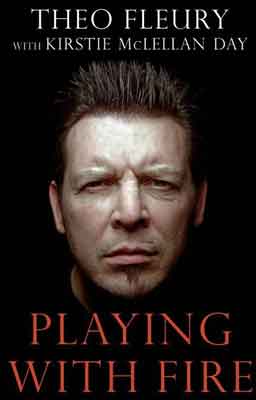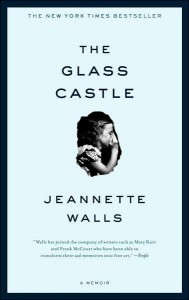 Theo Fleury’s autobiography Playing with Fire is as direct and hard hitting as his play was on the ice.
Theo Fleury’s autobiography Playing with Fire is as direct and hard hitting as his play was on the ice.
That shouldn’t surprise anyone who followed the National Hockey League in the 1990s. Fleury was known as much for his energetic style and dynamic playing-making ability as his knack for pissing people off and getting in to trouble both in the arena and in real life.
Playing with Fire is Fleury’s memoir and confessional where he brings every imaginable skeleton out of his closet for all to see.
It’s a dark, often depressing look at his life on and off the ice. The turning point of the book comes early, when Fleury attends Andy Murray’s hockey camp and meets the scout and junior hockey coach Graham James, infamous for being convicted of the molestation of NHLer Sheldon Kennedy.
Of course, when the 13-year-old Fleury attended the camp, James’ dark second life wasn’t public knowledge and, according to the book, the vulnerable kid from Russel, Manitoba soon fell victim along with his friend Kennedy.
This revelation is what grabbed all the headlines when Playing with Fire was first published in 2009 and it is the central issue of the entire autobiography. All of Fleury’s behaviour afterwards is a reaction to the alleged abuse, either to distract himself from the guilt and pain of James’ assault or because he’s lashing out in anger.
Playing with Fire therefore serves as Fleury’s confessional, as he tries to explain his behaviour for most of his adult life and also tries to apologize to the many people he hurt or wronged, including teammates like Craig Conroy and Robyn Regher but especially his children Josh, Beaux and Tatym.
In many respects, reading Playing with Fire reminded me of professional wrestler Bret Hart’s autobiography Hitman. Both are athletes with deep connections to Alberta and Calgary, both are known for their incredible skills and both have a variety of personal problems stemming from abuses suffered while they were kids.
However, there are still differences. Hart is undoubtedly the better writer, but Fleury is the more genuine author. Hart is shockingly cavalier about the sex, drugs and violence in his professional and personal life, while Fleury is remorseful and regrets most of his behaviour.
Although this makes Playing with Fire less entertaining than Hitman, it’s also more emotionally fulfilling. The lows may be lower in Fleury’s narrative, but the highs are also higher.
Hart comes across as a bitter old man by the end of his book, while Fleury is clearly a happier, healthier person hoping to give back to society through his book, public speaking and charitable works.
Playing with Fire is definitely worth a read. Not just for hockey fans who want to read all about Theo Fleury’s wild stories, but for its value as a cautionary tale for any parents considering getting their child involved in amateur hockey.
 I never thought that I’d enjoy Jeannette Walls’ the Glass Castle, but I was wrong.
I never thought that I’d enjoy Jeannette Walls’ the Glass Castle, but I was wrong.
On the surface, it looked like it was more for stay-at-home moms. It was one of Heather’s Picks at Chapters-Indigo Bookstores and reeked of Oprah’s Book Club. But once I started reading it I appreciated Walls’ writing and was moved by her story.
Like Frank McCourt’s ultra-popular Angela’s Ashes, the Glass Castle is a dark memoir about a dysfunctional family crippled by the father’s alcoholism and the mother’s loose grip on reality.
The Glass Castle also follows a very similar format to Angela’s Ashes with each short chapter detailing an episode from the childhood of the author. More often than not these are horrible snapshots of poverty or struggle as the Walls’ household disintegrates.
These grim anecdotes are broken up by some funny stories from Jeannette’s childhood and the reader is buoyed up by the loyalty of her three siblings as they try to support each other and overcome their parents’ shoddy upbringing.
Walls’ writing is very good and although the subject matter is depressing and unsettling, she wisely injects some humour to create some balance.
What interested me the most was the social dynamics within the Walls household. Jeannette and her three siblings all independently come to the conclusion that their parents are unfit to raise them and that they need to take matters into their own hands.
Writing a compelling memoir is difficult. I’ve read many autobiographies that tell the author’s life story chronologically and from a single perspective. That’s a totally fair and natural way to structure a narrative, especially since an omniscient narrator would be some trick, but it’s obviously also quite limiting.
But Walls – a long-time journalist and former blogger with MSNBC.com – does well to flesh out the “characters” of her family and imply the feelings and motivations of each relative. This adds depth to her story that most autobiographies lack. The way her parents and sibling handles each situation is unquestionably real.
Walls is also a reasonably fair and balanced narrator. Her family might not be thrilled with their personal histories being exposed, but it’d be hard for any member of the Walls clan to say that Jeannette did them a disservice. She lets their actions speak for themselves and rarely puts words in their mouths.
Normally I would dismiss the Glass Castle out of hand. But Walls’ incredible storytelling abilities and the devastating circumstances of her childhood make this memoir a must-read for any fan of literature.
 I never thought that I’d enjoy Jeannette Walls’ the Glass Castle, but I was wrong.
I never thought that I’d enjoy Jeannette Walls’ the Glass Castle, but I was wrong.